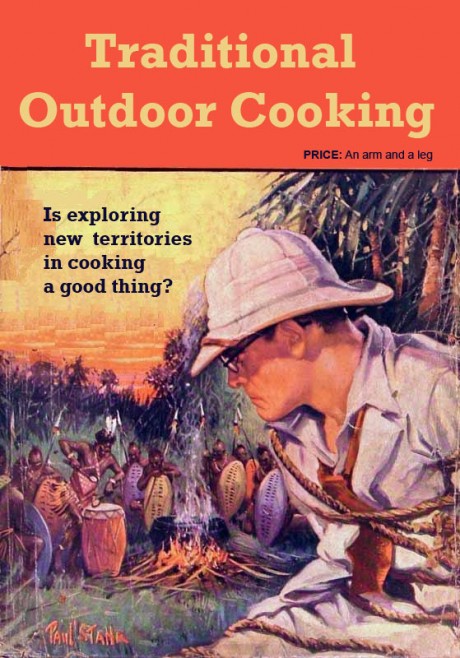The Traditional Cookbook; Not Quite Done Yet
Posted by Miles Harrison on Monday, May 9th, 2011Tags for this Article: cookbooks, Digital Age, future

The computer has slammed the oven door on the souffle of traditional publishing. Even the cash cow cookbook market has not been immune to the deflation. Juggernaut publishers such as Chronicle struggle to cook up new ways (like commissioning videos) to make them more attractive to buyers. Gourmet Magazine blames online recipes for the decline. With the advent of the Kindle and iPad the foundations of the old publishing model are quaking. What this means for the future of cookbooks remains to be seen – but it is fun to speculate.
Among the obvious predictions of the future of cookbooks include greater interactivity between the people who buy the book and the author.
The idea of interactivity itself is hardly new. It naturally occurs when any sort of community gets together. Online communities merely make it easier for people to interact with each other. Celia Sack owner of Omnivore Books in San Francisco, would see this as an extension of what currently happens within her shop as she notes there is “nothing better than watching a few customers exchanging their experiences with certain recipes & cookbooks, creating community right here in the store“.
In a typical online community model, the cookbook becomes a living document. Publishers simultaneously release the book and an accompanying website which both point to each other to help drive sales and web traffic. In some cases the site would be released first as a teaser with some initial content made available to “taste”, and a reduced rate made available for pre-orders. All this to generate buzz, get a sense for interest and demand and calculate print runs. These sites themselves are funded with ads from suppliers of relevant products and equipment mentioned in the book. The publisher’s general large advertisers are spread out across multiple titles, supporting the weaker ones. Buyers of the book, and ultimately the users of the recipes, comment on their experience. The archiving of comments, good or bad, with replies and tips from the authors, can reshape the book as an online resource and the book grows organically. Exclusive content is available for the book purchasers.
In many ways, this is already happening.
Another new model might see individual recipes or chapters of books sold a la iTunes for as low as 99 cents each or the entire book at a ‘discount’ rate.
Then, of course there is the favorite online password protected subscription or pay-gate based service which everyone loves so much because it generates a steady cash flow.
Among the more way-out future cookbook concepts is a Jetsonesque techno marvel seen here that outputs flavour strips based on the ingredients and proportions you decide, allowing you to fine tune the ingredients more to your liking before you engage in the actual preparation.
Some of these ideas are really just methods to bypass traditional book distribution, but what I’d like to focus on are some of the new ways to present the actual information.
First off, there are people who will always prefer the paper version of cookbooks. They appreciate the natural patina that occurs when this physical object is used in context – the dog-eared pages, the tomato paste splatters and penciled margin notes.
If digital publishers can solve this tactile attraction, or if it eventually breeds itself out of our culture, paper-based cookbooks hardly stand a chance. Digital information is just simply too easily manipulated and so instantaneous. Not to mention it’s abundance and variety, all nicely compacted into the tiniest of spaces. If you are like me, you hated moving your books and vinyl records from apartment to apartment.
Perhaps a savvy developer could replicate that patina quality visually into their digital publishing. Every time the cook uses a particular recipe, some it’s ingredients somehow get on the “pages” and, over time the pages themselves become more yellowed and dog-eared. Digital degradation over time would be random and unique, just like a real book.
On the other hand, there is the school of thought that thinks “why bother”. Why bother trying to replicate an old technology with a new one. It’s an entirely different paradigm so why not focus on an elegant user experience and play off the new paradigm’s strengths. It’s not a cookbook so why try to make it act like one. What’s important to a cookbook isn’t that it’s pages turn or it’s heft. What’s important and valuable is the information it imparts to the user. The new digital “heft” will be it’s ease of use by way of interactive design, quality of content and imagery.
Publishers are right now fumbling through how to handle digital heft. New ways of presenting digital information pop up daily. The most recent is Push Pop Press’ release of Al Gore’s new “book”, which is full of surprises and new ways of presenting digital information.
It’s only a matter of time before this type of thinking is applied to cookbooks. I find it quite exciting what’s simmering in the pots of cookbook creatives and can’t wait to find out what boils to the surface. Please keep us posted if you see anything interesting in the field.


Posted on May 10th, 2011
Ben Garfinkel says:
I still don’t think there’s a substitute for a good paper-based cookbook. However, the one limitation is the ease with which recipes and information can be referenced ACROSS sources using electronic/online means. I recall reading (online) somewhere someone’s comment that their favourite cookbook is their $3,000 laptop…the utility of which is only offset by the threat of ruining it while cooking from it! Kind of true. However, with cheaper and cheaper devices and the advantages they bring, even that issue is becoming moot. I think the iPad has sufficiently crossed that bridge.
Those who cook are probably still, and always will be, attached to their physical book collections, even if they seldom reference them.